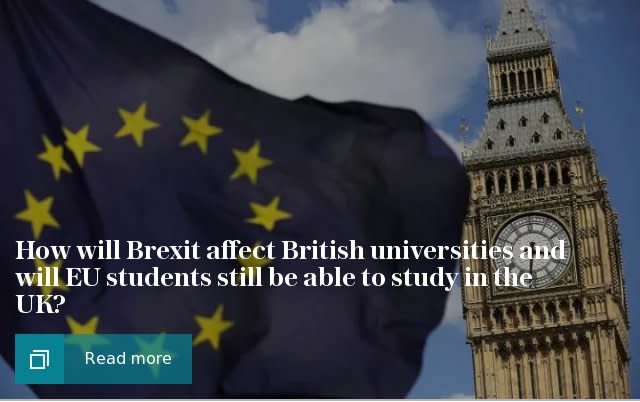World leaders could turn their backs on the UK if we close our universities to international students

Former Prime Minister David Cameron, Chancellor Philip Hammond and now the leader of the Scottish Conservatives, Ruth Davidson, have all spoken in support of removing international students from our net migration figures.
This is the right move, and would send a message to the world that Brexit does not mean that the UK will retreat from open engagement with world powers. The impression we are giving is that we want to reduce the number of international students, which is blatantly not the case.
Indeed, we should have a target to increase the number of international students in the UK, so important are they to the UK. They greatly enrich the experience of domestic students.
They are our number one source of soft power in the UK, with figures released this week from the Higher Education Policy Institute finding that British-educated heads of state and heads of government outnumber those educated anywhere else in the world – even the US, with top universities like Harvard and Yale.

We should remove international students from net migration figures, dissociating them from the Government’s pledge to reduce net migration to the tens of thousands – a pledge which is nothing more than rhetoric, which the Government has plucked from thin air, and has failed to deliver on, year after year.
We should classify international students as temporary residents, both in line with the USA, Canada and Australia and with public opinion, with a ComRes poll conducted after the EU referendum finding that under a quarter of the British public considered international students migrants. The same survey found that over 70 per cent would support policies to boost growth by increasing overseas students.
Australia and Canada both have targets to increase the number of students who study at their new universities. Their universities are going to educate the next generation of business leaders and political influencers, following in the footsteps of the UK’s successes.
We cannot allow the Government to neglect our world-class universities as it tackles the Brexit negotiations. The Government simultaneously wants to tighten its grip on UK law, and ‘take back control’ over our borders after Brexit, as well as opening to the world and targeting lucrative trade deals after leaving the European Union. But the realities of Brexit pose a great threat to universities unless are concerns are listened to.
The UK is a global player and we derive power from our global influence. We are just one per cent of the world’s population, but we are the seventh largest economy in the world.
The Government’s power to determine the UK’s future relies on the depth of our relationships with the world’s established powers and, increasingly, with emerging markets too, not least India.
Yet the Government has shown disregard for the needs of those countries that we wish to trade and do business with.
I was proud to have tabled the motion in the House of Lords on Gordon Brown’s very first day as Prime Minister in 2007 that led to students being granted a two-year post-study work visa after they graduate.
In 2012, the Government abolished it and the detrimental effect on the UK’s ability to attract international students to the UK since 2012 has been visible.
The number of Indian students studying in the UK is currently barely half the number who studied in the UK in 2010.
The Prime Minister and former Home Secretary Theresa May, and the current Home Secretary Amber Rudd, may consider this some way towards meeting their target to cut net migration to the tens of thousands.
But the two-year post-study work visa was designed to give talented students the freedom to work in the UK after they graduate, thus allowing them to earn some money, pay for their studies, contribute to the UK economy, pay taxes in the UK and further build their generation-long links with Britain.
The economic impact of international students in the UK was estimated by Universities UK at over £25 billion, and for fast-growing sectors like technology and vital strategic sectors in the UK such as advanced manufacturing, they form an important part of the talent pipeline, too.
Furthermore, most students return to their country of origin and go on to become lifelong ambassadors of the UK. They reach the highest level in every field, becoming successful business leaders, entrepreneurs, and even heads of state, as the figures from HEPI show.
The skills, talents and connections that British university education provides for its international students are second to none, and the Prime Minister’s counterparts know this means that the free trade deals we strike are about more than tariffs and duties.
We cannot sacrifice this in the name of ‘taking back control’. Higher education policy needs to come from an educated perspective.
Lord Bilimoria is the Founder and Chairman of Cobra Beer, President of the UK Council for International Student Affairs, Chancellor of the University of Birmingham and Founding Chairman of the UK-India Business Council

 Yahoo News
Yahoo News 
